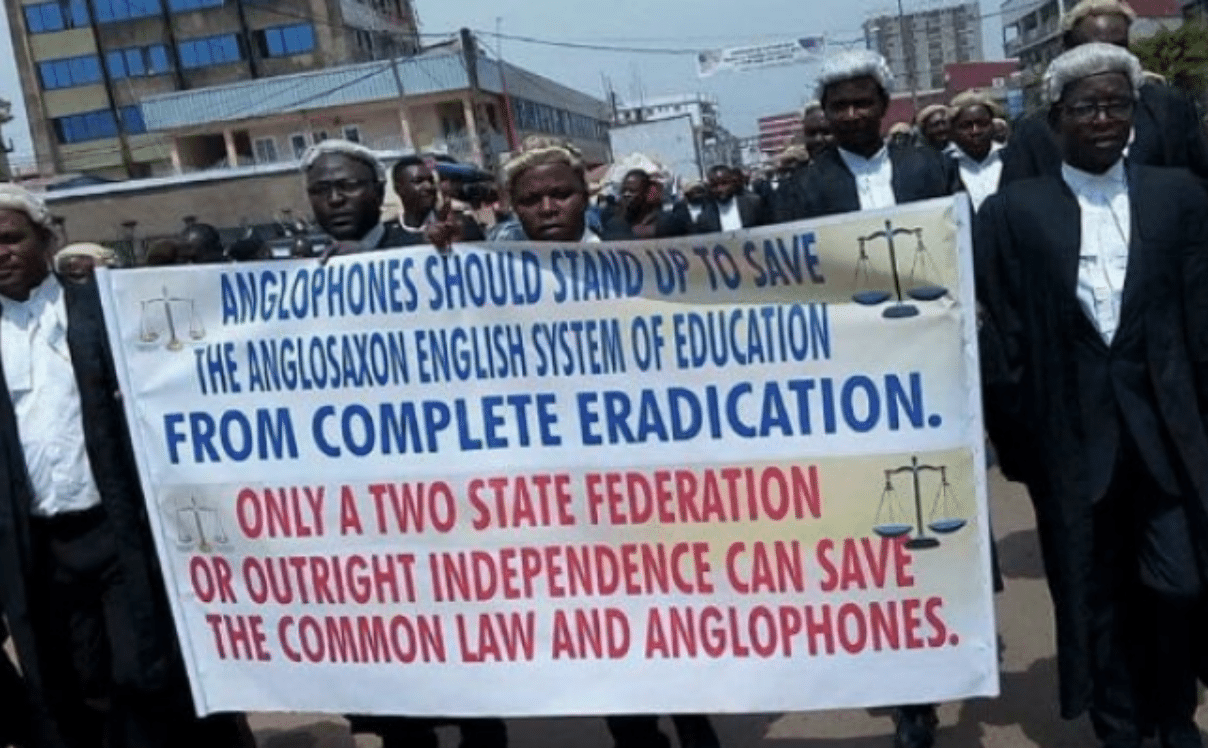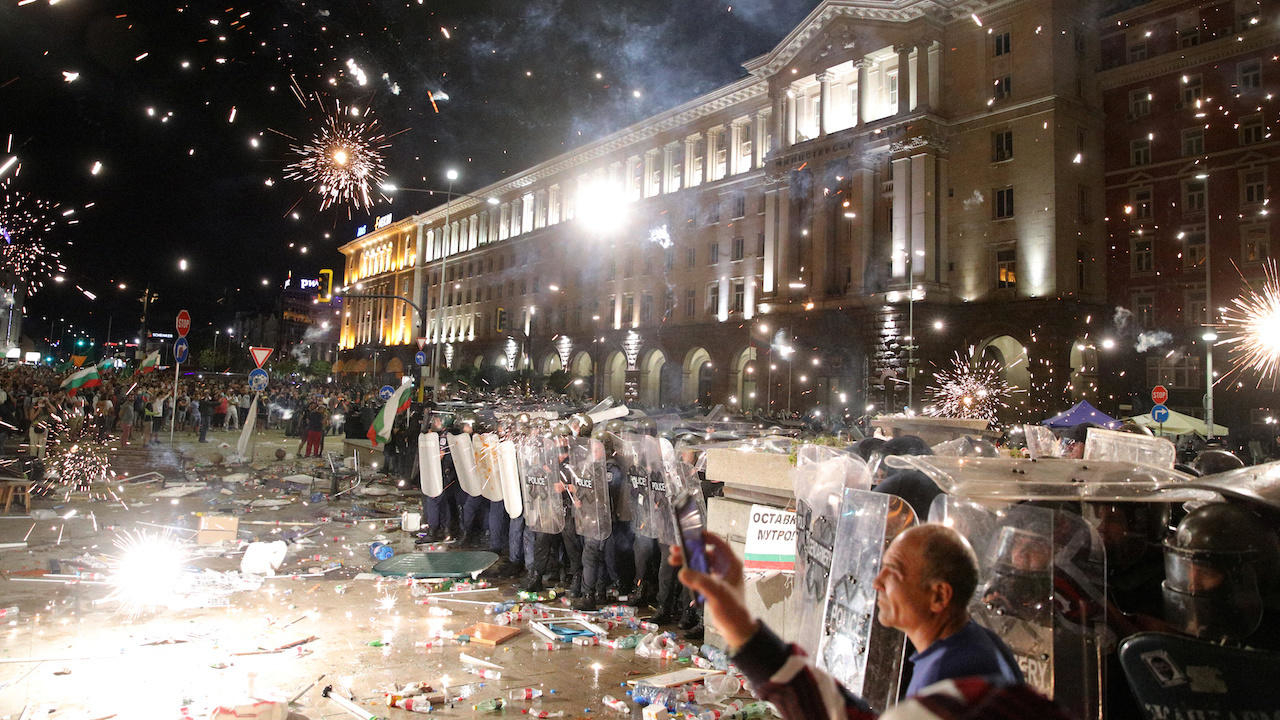Cameroonian refugees are flooding into Nigeria, following a military crackdown on separatists in the Anglophone (english-speaking) region of Cameroon. The United Nations (UN) refugee agency and the Nigerian government estimate that 15,000 Cameroonian Anglophones have crossed the border so far.
Over the last several months, as Anglophone teachers and lawyers call for reform against the omnipresence of France in the nation, protests and military crackdowns by the predominantly French-speaking government have continued. In November, the dissension broke into violence when the Anglophone movement called for an independent “Ambazonia” state.
Concern grows for women and children fleeing #Cameroon : https://t.co/j0utROii5d via @refugees
— UNHCR Cameroon (@RefugeesCmr) January 22, 2018
Among the Anglophone refugees, according to earlier reports, are thousands of cocoa farmers from the most productive agricultural region of Cameroon. The region impacted by the unrest grows around half of Cameroon’s cocoa, which is the country’s principle agricultural export. The industry also represents a large portion of the country’s workforce, as 60% of the country works in agriculture.
To make matters worse, Nigerian traders have begun a bustling smuggling ring with the remaining cocoa farmers, offering higher prices for beans and further depriving Cameroon’s economy of revenue.
For Cameroonian President Paul Biya, the refugee crisis will be a key issue as he campaigns to prolong his 35-year rule in the country later this year. The total refugee head count is only expected to grow until then.
“Certainly there are more, how many more we are not able to state,” said Antonio Jose Canhandula, the UN High Commissioner for Refugees’ (UNHCR) representative in Nigeria, at a briefing in the Nigerian Capital Abuja. He was explaining that the number of refugees (15,000) might be a low estimate, because that number is based on the voluntary registration of the refugees with the UNHCR.
Although Sadiya Umar Farouq, the head of Nigeria’s National Commission for Refugees, has pledged to aid the refugees coming over the border, the Nigerian state has given no support to the political aspirations of the Anglophone separatists.

12 Anglophone separatist leaders were taken into custody by Nigerian authorities after they met in the Nigerian capital Abuja last week. Among these leaders was Sisiku Ayuk Tabe, the chairman of the self-proclaimed Governing Council of Ambazonia. The Nigerian Department for State Service officially denied making the arrest, despite an eyewitness reporting the event to BBC. The Governing Council has since released a formal demand for Mr. Tabe’s release.
Last month, Cameroonian troops encroached on Nigerian territory in pursuit of rebels, causing a diplomatic incident with Nigeria. The dispute between the Cameroonian language factions may also represent a problem for the French and the British, as the linguistic divide is due, in part, to a century-old agreement to split Germany’s African colonies following the First World War.
On January 25th, the government of Cameroon and the United Nations launched the “2018 Cameroon Humanitarian Response Plan,” which seeks $305 million “to provide urgent assistance to come 1.3 million people this year.”
#Cameroon faces multiple crises & migrations of ppl from Far North, NW&SW regions, says @MinepatCameroun working w/#humanitarian community@AllegraBaiocchi : HRP $305M #Appeal IS the opportunity to act together & provide urgent aid+development for all in #Cameroun incl #Refugeespic.twitter.com/TnShLrrIUE
— OCHA W&C Africa (@OCHAROWCA) January 26, 2018
[Main image: Cameroonian refugee families in Utanga, Obanliku, Nigeria, after fleeing insecurity in the English-speaking regions of Cameroon (UNHCR / Elizabeth Mpimbaza)]
LIMA CHARLIE NEWS
Lima Charlie provides global news, insight & analysis by military veterans and service members Worldwide.
For up-to-date news, please follow us on twitter at @LimaCharlieNews
In case you missed it:
Cameroonian refugees are flooding into Nigeria, following a military crackdown on separatists in the Anglophone (english-speaking) region of Cameroon. The United Nations (UN) refugee agency and the Nigerian government estimate that 15,000 Cameroonian Anglophones have crossed the border so far.
Over the last several months, as Anglophone teachers and lawyers call for reform against the omnipresence of France in the nation, protests and military crackdowns by the predominantly French-speaking government have continued. In November, the dissension broke into violence when the Anglophone movement called for an independent “Ambazonia” state.
Concern grows for women and children fleeing #Cameroon : https://t.co/j0utROii5d via @refugees
— UNHCR Cameroon (@RefugeesCmr) January 22, 2018
Among the Anglophone refugees, according to earlier reports, are thousands of cocoa farmers from the most productive agricultural region of Cameroon. The region impacted by the unrest grows around half of Cameroon’s cocoa, which is the country’s principle agricultural export. The industry also represents a large portion of the country’s workforce, as 60% of the country works in agriculture.
To make matters worse, Nigerian traders have begun a bustling smuggling ring with the remaining cocoa farmers, offering higher prices for beans and further depriving Cameroon’s economy of revenue.
For Cameroonian President Paul Biya, the refugee crisis will be a key issue as he campaigns to prolong his 35-year rule in the country later this year. The total refugee head count is only expected to grow until then.
“Certainly there are more, how many more we are not able to state,” said Antonio Jose Canhandula, the UN High Commissioner for Refugees’ (UNHCR) representative in Nigeria, at a briefing in the Nigerian Capital Abuja. He was explaining that the number of refugees (15,000) might be a low estimate, because that number is based on the voluntary registration of the refugees with the UNHCR.
Although Sadiya Umar Farouq, the head of Nigeria’s National Commission for Refugees, has pledged to aid the refugees coming over the border, the Nigerian state has given no support to the political aspirations of the Anglophone separatists.

12 Anglophone separatist leaders were taken into custody by Nigerian authorities after they met in the Nigerian capital Abuja last week. Among these leaders was Sisiku Ayuk Tabe, the chairman of the self-proclaimed Governing Council of Ambazonia. The Nigerian Department for State Service officially denied making the arrest, despite an eyewitness reporting the event to BBC. The Governing Council has since released a formal demand for Mr. Tabe’s release.
Last month, Cameroonian troops encroached on Nigerian territory in pursuit of rebels, causing a diplomatic incident with Nigeria. The dispute between the Cameroonian language factions may also represent a problem for the French and the British, as the linguistic divide is due, in part, to a century-old agreement to split Germany’s African colonies following the First World War.
On January 25th, the government of Cameroon and the United Nations launched the “2018 Cameroon Humanitarian Response Plan,” which seeks $305 million “to provide urgent assistance to come 1.3 million people this year.”
#Cameroon faces multiple crises & migrations of ppl from Far North, NW&SW regions, says @MinepatCameroun working w/#humanitarian community@AllegraBaiocchi : HRP $305M #Appeal IS the opportunity to act together & provide urgent aid+development for all in #Cameroun incl #Refugeespic.twitter.com/TnShLrrIUE
— OCHA W&C Africa (@OCHAROWCA) January 26, 2018
[Main image: Cameroonian refugee families in Utanga, Obanliku, Nigeria, after fleeing insecurity in the English-speaking regions of Cameroon (UNHCR / Elizabeth Mpimbaza)]
LIMA CHARLIE NEWS
Lima Charlie provides global news, insight & analysis by military veterans and service members Worldwide.
For up-to-date news, please follow us on twitter at @LimaCharlieNews
In case you missed it:












